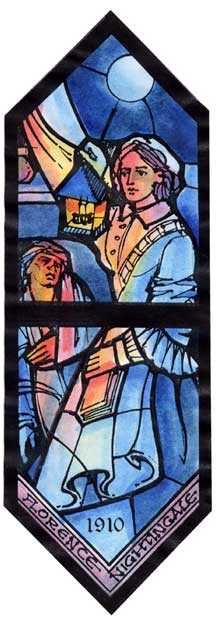|
|
|||

|
|||
Florence Nightingale Window
 Nineteenth century England was a hotbed of social reform. Anglicans in Parliament worked to outlaw slavery, reform care for the mentally ill, and improve working conditions for factory and mine workers. The Salvation Army was founded, and Christians of all persuasions formed Bible and missionary societies, Sunday Schools for the poor and other organizations to assist the needy. Possibly the most famous of these English reformers was Florence Nightingale. Florence was called to God’s service at the age of 16, but it took years for her to identify nursing as her vocation, and still longer to find her way into the field. At the time, hospitals were filthy, and nurses had a reputation for drunkenness and prostitution. Women of Florence’s social status were not permitted to do such work; yet, she never gave up on her call. Finally, Florence was able to train at a Lutheran hospital in Germany, and became superintendent of a private nursing home when she returned. But her life’s work really took shape during the Crimean War, when the British government called her to assist the army hospital in Scutari, Turkey. When she and her nurses arrived, the hospital had no beds, no operating tables or equipment, no soap or disinfectant, and no cooking supplies or provisions; so Florence and her nurses bought supplies (with Florence’s own funds), made beds, washed patients, cooked meals, and cared endlessly for the sick and wounded. Florence worked 16-20 hours a day, and it is said that she never let a man die alone. She checked on patients each evening before going to bed, carrying her lantern through the wards. The men became so devoted to her they would kiss her shadow as she passed. On her return to England, Florence was a national hero; yet, she refused all public appearances, throwing herself instead into the work of health reform. In 1904, she became the first woman to receive Britain’s Order of Merit, and by the time of her death in 1910, her Nightingale School of nursing had multiplied itself a thousand-fold. In her reforming zeal, Florence Nightingale brought modern nursing into its own and revolutionized military and public health care. She is depicted as the Lady with the Lamp, making her nightly rounds, and reminding us that Christ calls us not only to preach, but also to heal.
Like Stars Appearing: The Story of the Stained Glass
Windows of St. George's Episcopal Church, Dayton, Ohio | |||
|
|||
